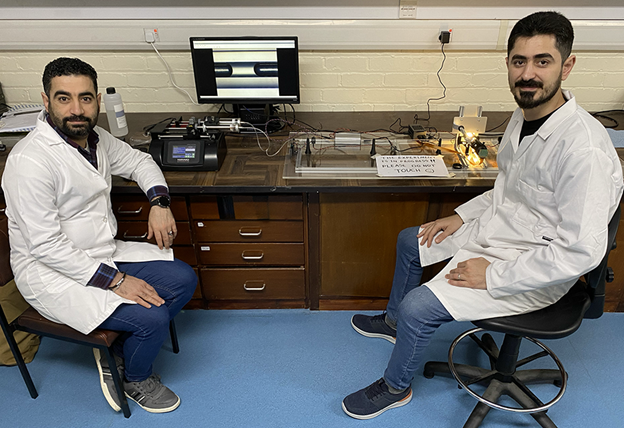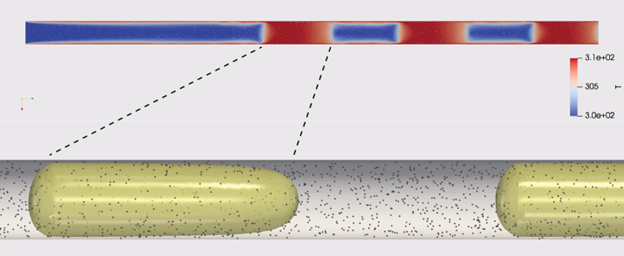In this case study, we hear from Faysal Khaleel and Fahad Al-Gburi (based in the School of Engineering), who have been utilising BEAR to study fluid dynamics problems in materials synthesis and heat transport applications.

We are PhD students within Dr. Jason Stafford’s research group in the School of Engineering and co-supervised by Prof. Yulong Ding in the School of Chemical Engineering. Our research aims to improve the sustainability of advanced materials manufacturing processes and the efficiency of cooling solutions in high-density electronics technologies.
Specifically, we work on fluid dynamic processes that consist of multiple phases and span multiple scales (nanometres to metres). Many advanced materials and chemical manufacturing processes involve solids, liquids, and gases (e.g. reagents, solvents) and are the ingredients from which we can make new materials for modern technologies. Resolving the flow, heat and mass transport behaviour of these systems helps to reduce waste, improve energy efficiency, and potentially develop materials with properties that can be tailored for the end application.

Our research has centred on creating accurate computational models that allow us to do this, and we recently published some of this work for three-phase flows (https://doi.org/10.1016/j.ijmultiphaseflow.2024.105117). Now, we are developing this into an open-source solver built within the OpenFOAM framework, and this will be able to predict multiphase flow and heat transport phenomena down to the nanoscale. The computational demands of resolving flow phenomena with phase interfaces and hundreds of millions of particles in these multiscale systems requires extensive computational resources. This research and the insights we gain are made possible by the tremendous computational facilities of BlueBEAR.
It is also a satisfying feeling to think that we are using HPC resources in our research to help HPC systems become more energy- and resource-efficient in the future!
For the other application of our research – thermal control of electronics – there is an opportunity to significantly enhance heat transport by introducing multiple phases (e.g. nanofluids, phase-change phenomena). This is particularly important as data centre demands continue to grow, as well as their resource usage (energy and water). It is also a satisfying feeling to think that we are using HPC resources in our research to help HPC systems become more energy- and resource-efficient in the future!
We have developed physics-informed human-centric visualisations of our data that would take months to render on traditional workstations.
Dr. Jason Stafford added: Access to the BlueBEAR HPC environment has enabled us to develop our own solvers and scale them to the point where we can accurately predict and study these complex fluid dynamics problems in detail. This would not have been possible without the world-leading advanced computing facilities available at Birmingham. Beyond providing fundamental insights, it has also been an indispensable resource for accelerating our outreach activities. We have developed physics-informed human-centric visualisations of our data that would take months to render on traditional workstations. This has helped us engage with the public effectively on topics such as clean air and limiting human exposure to harmful particle pollutants in urban environments (https://doi.org/10.1098/rsos.241111), work which was recently highlighted by The Times, Physics World, and other global media outlets.
We were so pleased to hear of how Fahad and Faysal were able to make use of what is on offer from Advanced Research Computing, particularly to hear of how they have made use of BlueBEAR HPC – if you have any examples of how it has helped your research then do get in contact with us at bearinfo@contacts.bham.ac.uk.
We are always looking for good examples of use of High Performance Computing to nominate for HPC Wire Awards – see our recent winner for more details.
